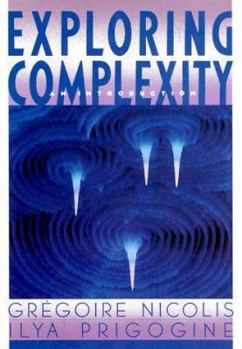Exploring Complexity
Select Format
Select Condition 
Book Overview
Exploring Complexity surveys the wide range of complex phenomena arising in the framework of physico-chemical and biological systems and in the global environment. The book defines the elements of a... This description may be from another edition of this product.
Format:Hardcover
Language:English
ISBN:0716718596
ISBN13:9780716718598
Release Date:October 1989
Publisher:W.H. Freeman & Company
Length:328 Pages
Weight:1.43 lbs.
Dimensions:1.1" x 6.2" x 9.4"
Customer Reviews
3 ratings
A Foundation of Complexity
Published by Thriftbooks.com User , 15 years ago
I do strongly agree with the first reviewer that the most effective way to get into complexity is to start with the original! At present, the complexity theory is overwhelming - covering the application ranging from physics to social sciences. However, I think only few people outside the mainstream of sciences know that the origin of this theory is from the "Brussel School of Thought" pioneering by Theophile De Donder and perfecting by Ilya Prigogine and his colleagues in the past century. All of whom were working on non-equilibrium and statistical thermodynamics. Perhaps, the greatest contribution this group of scientists (the majority of which are physical chemists) have made is the discovery of order that can sponteneously arise out of randomness through the influx of energy and the export of entropy. This idea has been further elaborated and developed into the theory of dissipative structures in which the dynamics of complex systems are described and explained. For the general readers, I would recommend "Order out of Chaos: Man's New Dialogue with Nature" (Prigogine and Stengers, 1984) as a primer before going into this volume. The early chapters of "The Self-Organizing Universe: Scientific and Human Implications of the Emerging Paradigm of Evolution" (Jantsch, 1979) also helps. This book is a concise and comprehensive introduction to the the field of complexity. A prior knowledge on non-equilibrium and statistical thermodynamics and non-linear dynamics will be a great help, but not compulsory, to appreciate this work and I would recommend this book to the readers with technical backgrounds and want to get into the field of complexity in a serious fashion. Doy Sundarasaradula May 9, 2009
Intuitive view about the emergence of complexity
Published by Thriftbooks.com User , 23 years ago
It explains, mainly through examples in chemistry and physics, what are the required components for "complex behaviors" to occur within dynamical systems. It does not insist on the technicalities proper to the examples but rather tries to gather what one can learn from specific situations concerning the necessary components for complexity to arise. Focus is on intuition and global understanding, not on mathematical aspects. However, some knowledge in math would certainly help...a first course in probability theory and some background in dynamical systems is a good idea (at the level of undergraduate courses in pure and applied sciences).All explanations are not rigorous but the objective is to provide a good intuition about the mechanisms driving complexity. Recommended for all people interested in stochastic modeling and chaos theory.
Want to learn about complexity? Start at the source!
Published by Thriftbooks.com User , 25 years ago
Since non-equilibrium science and complexity theory where actually shaped and influenced by the Brussels school, anybody interested in a concise -yet readable- introduction would do well to start with this book. Written by Nicolis and Prigogine, it will enlighten and entertain you. Some knowledge of math helps when reading this book, but the level is intermediate, thereby making it suitable for a rather large group of interested readers. I found myself reading the book in stages, taking the time to ponder various topics and issues before continuing again. It really made me wonder, and I learned a lot from it (ironically, I actually learned more from this book than from the -much- more advanced books by the author(s) that cover the same material).





